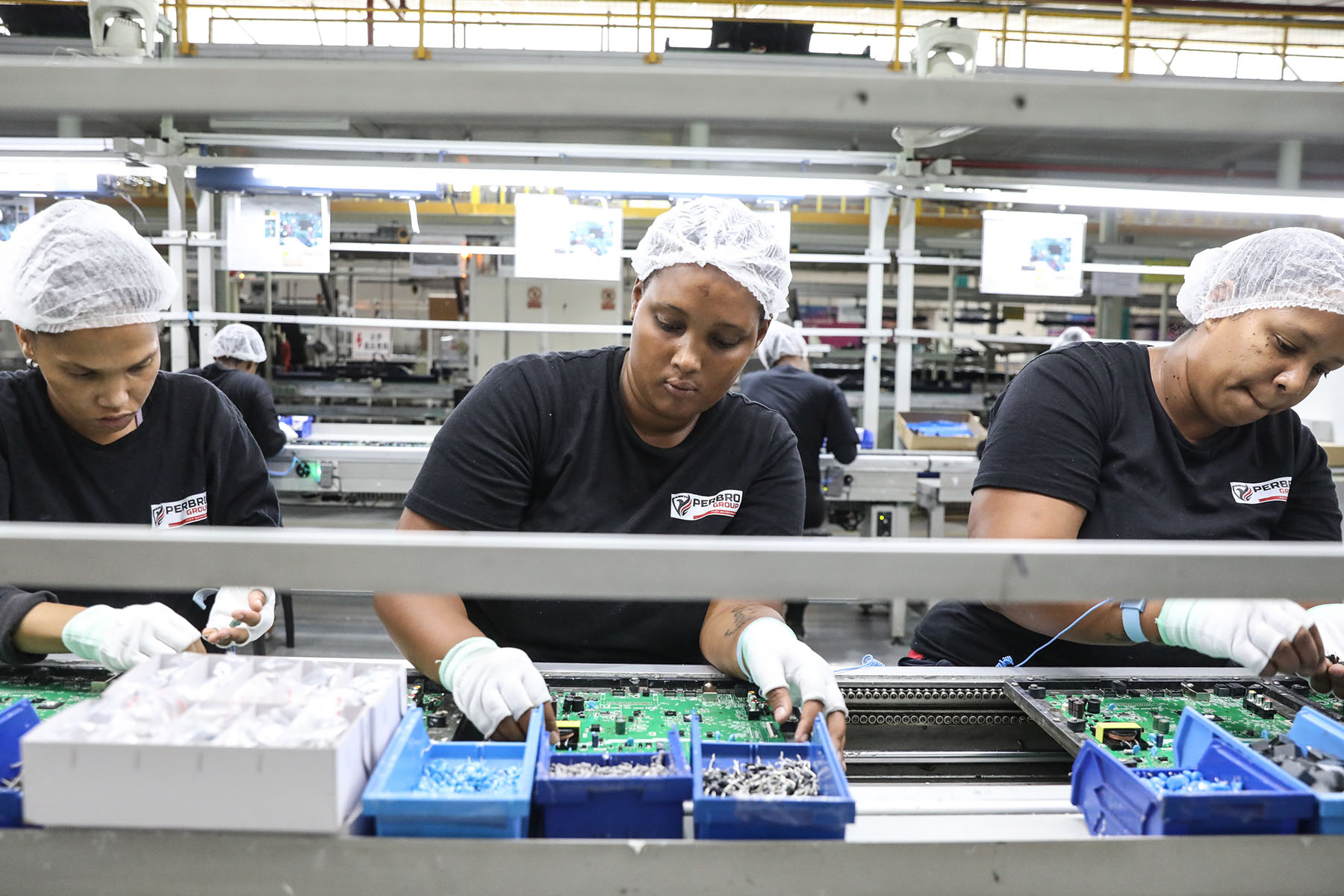Production bases abroad create more job opportunities for local people

Chinese home appliance makers are ratcheting up efforts to expand their presence in overseas markets and increase investments in localized operations covering research and development, production and marketing.
This is part of a broader push to seek new revenue sources and enhance the competitiveness of domestic enterprises globally.
Experts said establishing overseas manufacturing bases and production lines not only helps in taking China's advanced manufacturing, R&D and management capabilities abroad, but also creates job opportunities for local people and boosts the international awareness and influence of Chinese brands.
READ MORE: Foreign trade expected to continue steady growth momentum
They also said that enhancing global operational capacity will help Chinese manufacturing enterprises better utilize global resources, thus further promoting the transformation and upgrading of China's traditional manufacturing sector, given that the country has placed great emphasis on establishing a modern industrial system.
Chinese home appliance maker Hisense Group has accelerated steps to expand its footprint in Europe, Africa, the Americas, the Middle East, Australia and Southeast Asia and ramped up its investment in technological innovation to target high-end markets abroad.
Jia Shaoqian, chairman of Hisense, said the company has set up 26 R&D centers, 36 industrial parks and production bases and 64 overseas branches across the globe.
Jia also highlighted the company's determination and commitment to pressing ahead with its globalization strategy.
Jia said the company has established a complete industrial system, including R&D, production, sales, supply chain and services, while making forays into overseas markets, in order to better serve local markets and consumers. It aims to strengthen capacities in localized manufacturing, research and development, and talent cultivation.
Hisense's revenue reached 202.2 billion yuan ($28.6 billion) in 2023, while its overseas sales stood at 85.8 billion yuan, accounting for more than 42.5 percent of the company's total revenue.
The Qingdao, Shandong province-based company has invested heavily in Africa.
According to Jia, Hisense entered the South African market 30 years ago and built an industrial park covering an area of more than 100,000 square meters in the country, creating over 1,000 direct employment opportunities and more than 5,000 indirect ones.
"Over the past three decades, Hisense has deeply integrated with African enterprises within the continent's industrial and supply chains," Jia said.
Sales of Hisense's televisions and refrigerators have taken the top spot in the South African market, he added.

Jia said Hisense is speeding up its business footprint in Nigeria, Angola, Egypt, Algeria and Morocco, with the recent investment focus on North Africa.
For instance, the company signed an agreement with local partners to establish a new factory in Egypt in August. The plant will cover an area of about 200 mu (13.33 hectares), and commence production next year.
In addition to meeting local demand in Egypt, the products made by the factory will be exported to 21 countries and regions, including the League of Arab States, North Africa and East Africa before gradually expanding into West Africa, the European Union and the Americas.
The company has also helped build an intelligent bus system in Ethiopia's capital Addis Ababa and improved the operational efficiency of local public transportation.
The project is the first of Hisense's intelligent transport business overseas and is expected to optimize the travel experience of local residents.
Fang Xueyu, president of Hisense's international marketing unit, said localization is at the core of globalization, and companies need to satisfy demand from local consumers and provide products suitable for local markets.
Apart from the African market, the company has also accelerated its expansion in Europe, having set up six R&D centers and five major manufacturing bases, with sales revenue in the continent rising 19.5 percent year-on-year to 3.8 billion euros ($4.15 billion) last year.
Data from market consultancy AVC Revo showed that the shipments of Hisense TVs in Europe increased in the first quarter of this year by 35.9 percent year-on-year.
The company accounted for 13.6 percent of global TV shipments during the same period, ranking second in the world, according to market research company Omdia.
Moreover, it has boosted brand awareness and influence on the global stage via sponsorships of major world-class sporting events, including prominent soccer tournaments like the 2018 FIFA World Cup in Russia, the 2022 World Cup in Qatar, and UEFA 2016, 2020 and 2024.
"It is inevitable that Chinese home appliance manufacturers are expanding their footprint overseas for new profit growth points and long-term development, as the domestic home appliance market is almost saturated," said Zhao Meimei, assistant president of Beijing-based market consultancy All View Cloud, which specializes in home appliances.
Building a sound global industrial chain and enhancing operational capacity in the overseas markets will help Chinese home appliance companies make better use of global resources, reduce operational costs and improve management efficiency, Zhao added.
She highlighted the growing importance of China's manufacturing on the global stage as the country has become the world's largest manufacturing hub and boasts complete industrial chains.
"Globalization is both an opportunity and a challenge for Chinese home appliance manufacturers," she said.
This will promote the sector's high-quality transformation and upgrading, Zhao added.

Exports of Chinese-made home appliance products have become a bright spot.
According to the General Administration of Customs, China's exports of household appliances rose 9.9 percent year-on-year to 617.42 billion yuan last year.
"Expansion into overseas markets will not only relieve the pressure of high inventories in the domestic market, but also increase the international influence of Chinese home appliance companies," said Dong Min, secretary-general of the China Video Industry Association.
Dong said in the past, most Chinese enterprises adopted the original equipment manufacturer or OEM model, but nowadays they have built up self-owned brands in a bid to bolster competitiveness on the global stage.
Retail sales of China's home appliances sector reached 849.8 billion yuan in 2023, up 3.6 percent year-on-year, according to AVC.
Chen Hui, general manager of AVC Revo, said, "Chinese household appliance companies have increased their manufacturing capacities overseas and improved their global layout to mitigate the negative impacts of tariff barriers and reduce costs since the start of trade frictions between China and the United States."
Chen said establishing global R&D centers will help Chinese enterprises gain innovation advantages, master new technologies and obtain a greater voice in increasingly fierce international competition.
The Middle East and Africa serve as important markets participating in the Belt and Road Initiative, presenting huge growth potential for Chinese enterprises to expand their global footprint, industry insiders said.
Last month, Hisense opened a research and development center in Dubai, its first comprehensive R&D facility in the Middle East and Africa region, which represents one of the fastest-growing markets for the company covering 74 countries and regions with a total population of about 1.5 billion people.
The center is designed for R&D of air conditioners, TVs, refrigerators and washing machines, as well as energy efficiency and sustainability projects. It will also serve as Hisense's training base for its regional sales and service teams and local partners.
The establishment of the center "represents not only Hisense's long-term commitment to engaging Dubai and the Middle East and Africa markets, but also its determination to get closer to its customers and provide them with higher-quality products and service," said Jia.
Hisense also recently opened a new factory in Egypt, as part of the company's effort to speed up its business layout in Africa. It has built multiple production lines or new factories with local partners, producing not only home appliances, but also business-to-business products such as car use air conditioners, Jia said.
Moreover, Chinese robotic vacuum cleaners, as a new type of intelligent home appliances, are gaining in popularity among overseas consumers as domestic players have stepped up their push to expand global presence.
Robot vacuum cleaner maker Dreame Technology has seen robust growth in international markets in recent years.
The company's export revenue surged more than 120 percent year-on-year in 2023, with global sales of its robotic vacuum cleaners surpassing 2.4 million units, skyrocketing 300 percent from a year earlier. Over 50 percent of its revenue came from overseas markets last year, it said.
Currently, Dreame Technology's products are available in more than 100 countries and regions, including Europe, North America, Southeast Asia, East Asia, the Middle East, Africa and South America.
The number of its brick-and-mortar stores has reached over 5,500 across the globe, and its robotic vacuum cleaners have captured the top spot by market share in Singapore, Germany and France.
Yu Hao, founder and CEO of Dreame Technology, said the company will increase investment in R&D, establish global industrial chain systems and retail networks and enhance operating capacity in international markets.
Liang Zhenpeng, an independent consumer electronics analyst, said overseas consumers have shown growing demand for China-made diversified, personalized and customized home appliances and are keen to buy intelligent and high-quality goods.
ALSO READ: Home appliances from China a hit overseas
Liang said he is bullish on the growth prospects of Chinese home appliance makers abroad.
"Meanwhile, Chinese manufacturers face some challenges and difficulties when expanding overseas; they should capture local demand on time, learn more about relevant laws, regulations and quality standards in these countries and regions, and adjust supply chains to make products that meet local requirements," Liang said.
The demand for household appliances varies across countries due to the different living habits and culinary traditions of the people, said Pan Jun, a visiting professor at Donghua University in Shanghai.
Chinese household appliance companies should attach greater importance to products' R&D, pour more resources into technological innovation and optimize product functions to cater to the diversified needs of shoppers overseas, Pan added.


